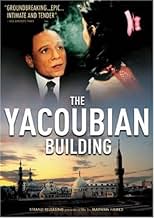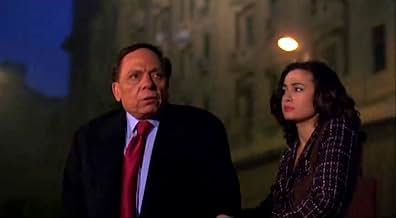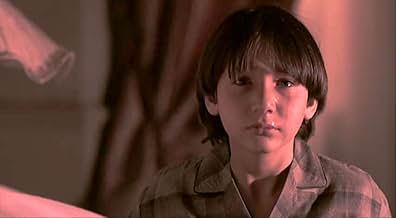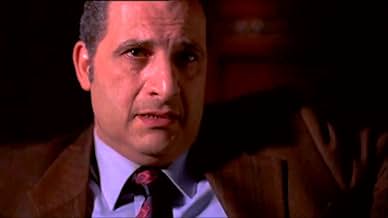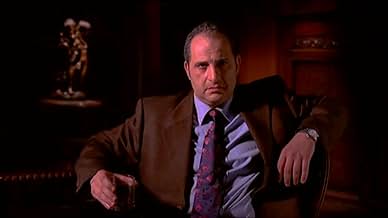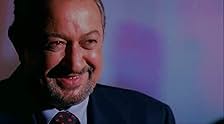Omaret yakobean
- 2006
- 2 घं 45 मि
IMDb रेटिंग
7.5/10
7.6 हज़ार
आपकी रेटिंग
अपनी भाषा में प्लॉट जोड़ेंMeditations on corruption, fundamentalism, prostitution, homosexuality, and drugs in central Cairo.Meditations on corruption, fundamentalism, prostitution, homosexuality, and drugs in central Cairo.Meditations on corruption, fundamentalism, prostitution, homosexuality, and drugs in central Cairo.
- पुरस्कार
- 9 जीत और कुल 5 नामांकन
Esaad Younis
- Dawlat El Dessouky
- (as Issad Younis)
Ahmad Bedair
- Malaak
- (as Ahmed Bedeir)
Hind Sabri
- Bothayna
- (as Hind Sabry)
Khaled El-Sawi
- Hatem Rachid
- (as Khaled El Sawy)
Basem Samrah
- Abd Raboh
- (as Bassem Samra)
Mohamed Emam
- Taha El Shazly
- (as Mohamed Imam)
Youssef Dawood
- Fekry Abdel Shaheed
- (as Youseff Daoud)
Talaat Zakaria
- Bar Owner
- (as Talat Zakariyya)
फ़ीचर्ड समीक्षाएं
"They" say it's overly faithful to the bestselling novel by Alaa Al Aswany which I have not read. . For Egypt, Yacoubian Building is the most expensive film ever (quotes vary). Director Hamid was 28 when he made it and is the son of the screenwriter who did the adaptation. The film is an ambitious and promising if under-edited piece. Perhaps it ought to have been in parts like Marco Tullio Giordana's The Best of Youth/La meglio gioventù, to which it has been compared. But instead it's a somewhat sprawling 172 minutes and feels at times like a smashed-together telenovela.
Hollywood Reporter says the film may "offer a revealing window into the secular world of a modern Islamic country -- its indulgence in alcohol, sexual promiscuity, political corruption and personal betrayals. From such 'deformities, the movie argues, Islamic fundamentalism gains its most passionate adherents." But we can do better than this crude analysis. Moroccan-born ,western educated novelist Laila Lalani points out the book (and consequently the movie) is full of prejudices against gays, resembles the old "large-scale melodramas" produced by Egypt's "huge film industry," with their "young idealists, desirable ingénues, old predators, and so on," and is crudely moralistic -- with almost every character forced to make choices that "ultimately result in either their downfall or redemption." It's also full of heavy-handed emotional manipulation, cliff-hangers, and so on. Alaa Al Aswany is no Naguib Mahfouz. Aside from the prejudice against gays, we're told that mixed marriages produce confused children, that all women love sex enormously, and so on. It's important to realize that however engaging the film is and notable the actors are in the Egyptian film world, it's made out of dross, not gold.
The titular Armenian-owned, Twenties Yacoubian Building in the once elegant, restricted central zone of the city "became home to Cairo's rich and powerful when it opened," Lalani writes. After the revolution, however, "storage sheds on the rooftop were rented out to poor families--a sort of sky-high slum." This allows for a story about the building's residents that spans society. The action is set in the 1990's. And the basic panorama goes something like this:
In the foreground is Zaki Bey El Dessouki, or "Zaki Pasha" (Adel Imam), a superannuated playboy kicked out of the family apartment by his mean, half-crazy sister. He may seem seedy, but he's the house aristocrat. Fanous (Ahmed Rateb) is his faithful manservant. Dawlat (Essad Younis) is his nutty, vindictive sister, who has always resented his fun loving ways and not is out to get him. Hatem Rasheed (Khaled El Sawy) is a gay editor who takes a good-looking soldier Abd Raboh (Bassem Samra) .from the country as his lover. Rasheed isn't mincing, but he reflects an Egyptian discomfort with gayness; still, he's seen three-dimensionally. He likes dark Nubian men because they remind him an early experience with a family servant. The film's treatment of the sexual aspect of Hatem's relationship to the soldier feels like something made in the 1950's. In general sex is a burden for the people in this movie, either a risky temptation or an ordeal. It gets nasty, and then the camera shrinks away.
Haj Assam (Nour El Sheriff) is a self-made millionaire (through a chain of stores selling modestly-priced women's clothing) with political ambitious. wants to get into the People's Assembly (Majlis al Sha'ab) for access to power. He takes a penniless young widow with a young son, Soad (Somaya el Khashab), as a second wife and forces her to have an abortion. As Lalani puts it, Assam "is the nouveau riche to Zaki' Bey's aristocrat." The brothers Abaskharon and Malaak (Ahmed Bedire) are Coptic Christians who save every penny they make, by legal and illegal means, in order to finally afford a room on the roof.
On the roof are Taha (Mohamed Imam)and Buthayna (Hind Sabry). Taha is the son of a bawab. A bawab is a doorkeeper, more like a concierge or a super in New York rather than "janitor" as it's translated. With such a lowly father, Taha is turned down by the police academy as not socially adequate to become an officer, and adopts a "plan B," to major in political science, which leads him to sympathy with the university religions fanatics and he eventually becomes an Islamic fundamentalist. His girlfriend Buthayna leaves him when he becomes religious and eventually she goes to work for Zaki, who's reformed and treats her well. She's previously been sexually harassed in every job she's had -- as we're shown in a lurid scene. Perhaps she feels too defiled to be worthy of one so innocent and decent as Taha, and she seems hardened A reader has pointed out that she is much poorer in the book than here. Laila Lalani says, "Egypt's young men are easy preys to religious extremism while the country's young women are victims of sexual exploitation." Taha is imprisoned and given Abu Ghraib treatment that de-islamicizes him. To get revenge, he trains as a terrorist -- a chain of events that looks frighteningly up-to-date.
The film has little details any Cairo downtown resident will know -- like Zaki yelling angrily because another resident has left the door of the antique elevator open on their floor so no one else can use it. Though this isn't Naguib Mahfouz, like him it attempts to draw a richly representative picture of a whole society. It's a rather sad picture with its disapproval of the present and nostalgia for the past.. And again, despite the three or six million dollars spent, some exterior sound is awful, the wrong kind of lens is used to pan up and down the city buildings, and some of the Islamicists' beards look pasted on. But with all that's going on, it holds your attention.
Shown as part of the San Francisco International Film Festival 2007. Earlier in the year one of the Film Comments Selects series at Lincoln Center, New York.
Hollywood Reporter says the film may "offer a revealing window into the secular world of a modern Islamic country -- its indulgence in alcohol, sexual promiscuity, political corruption and personal betrayals. From such 'deformities, the movie argues, Islamic fundamentalism gains its most passionate adherents." But we can do better than this crude analysis. Moroccan-born ,western educated novelist Laila Lalani points out the book (and consequently the movie) is full of prejudices against gays, resembles the old "large-scale melodramas" produced by Egypt's "huge film industry," with their "young idealists, desirable ingénues, old predators, and so on," and is crudely moralistic -- with almost every character forced to make choices that "ultimately result in either their downfall or redemption." It's also full of heavy-handed emotional manipulation, cliff-hangers, and so on. Alaa Al Aswany is no Naguib Mahfouz. Aside from the prejudice against gays, we're told that mixed marriages produce confused children, that all women love sex enormously, and so on. It's important to realize that however engaging the film is and notable the actors are in the Egyptian film world, it's made out of dross, not gold.
The titular Armenian-owned, Twenties Yacoubian Building in the once elegant, restricted central zone of the city "became home to Cairo's rich and powerful when it opened," Lalani writes. After the revolution, however, "storage sheds on the rooftop were rented out to poor families--a sort of sky-high slum." This allows for a story about the building's residents that spans society. The action is set in the 1990's. And the basic panorama goes something like this:
In the foreground is Zaki Bey El Dessouki, or "Zaki Pasha" (Adel Imam), a superannuated playboy kicked out of the family apartment by his mean, half-crazy sister. He may seem seedy, but he's the house aristocrat. Fanous (Ahmed Rateb) is his faithful manservant. Dawlat (Essad Younis) is his nutty, vindictive sister, who has always resented his fun loving ways and not is out to get him. Hatem Rasheed (Khaled El Sawy) is a gay editor who takes a good-looking soldier Abd Raboh (Bassem Samra) .from the country as his lover. Rasheed isn't mincing, but he reflects an Egyptian discomfort with gayness; still, he's seen three-dimensionally. He likes dark Nubian men because they remind him an early experience with a family servant. The film's treatment of the sexual aspect of Hatem's relationship to the soldier feels like something made in the 1950's. In general sex is a burden for the people in this movie, either a risky temptation or an ordeal. It gets nasty, and then the camera shrinks away.
Haj Assam (Nour El Sheriff) is a self-made millionaire (through a chain of stores selling modestly-priced women's clothing) with political ambitious. wants to get into the People's Assembly (Majlis al Sha'ab) for access to power. He takes a penniless young widow with a young son, Soad (Somaya el Khashab), as a second wife and forces her to have an abortion. As Lalani puts it, Assam "is the nouveau riche to Zaki' Bey's aristocrat." The brothers Abaskharon and Malaak (Ahmed Bedire) are Coptic Christians who save every penny they make, by legal and illegal means, in order to finally afford a room on the roof.
On the roof are Taha (Mohamed Imam)and Buthayna (Hind Sabry). Taha is the son of a bawab. A bawab is a doorkeeper, more like a concierge or a super in New York rather than "janitor" as it's translated. With such a lowly father, Taha is turned down by the police academy as not socially adequate to become an officer, and adopts a "plan B," to major in political science, which leads him to sympathy with the university religions fanatics and he eventually becomes an Islamic fundamentalist. His girlfriend Buthayna leaves him when he becomes religious and eventually she goes to work for Zaki, who's reformed and treats her well. She's previously been sexually harassed in every job she's had -- as we're shown in a lurid scene. Perhaps she feels too defiled to be worthy of one so innocent and decent as Taha, and she seems hardened A reader has pointed out that she is much poorer in the book than here. Laila Lalani says, "Egypt's young men are easy preys to religious extremism while the country's young women are victims of sexual exploitation." Taha is imprisoned and given Abu Ghraib treatment that de-islamicizes him. To get revenge, he trains as a terrorist -- a chain of events that looks frighteningly up-to-date.
The film has little details any Cairo downtown resident will know -- like Zaki yelling angrily because another resident has left the door of the antique elevator open on their floor so no one else can use it. Though this isn't Naguib Mahfouz, like him it attempts to draw a richly representative picture of a whole society. It's a rather sad picture with its disapproval of the present and nostalgia for the past.. And again, despite the three or six million dollars spent, some exterior sound is awful, the wrong kind of lens is used to pan up and down the city buildings, and some of the Islamicists' beards look pasted on. But with all that's going on, it holds your attention.
Shown as part of the San Francisco International Film Festival 2007. Earlier in the year one of the Film Comments Selects series at Lincoln Center, New York.
"The Yaboubian Building" reminded me of those over-heated Spanish soap operas that air nightly on Telemundo. The sweep and size of the film (not to mention its length) may fool people into thinking it's a more important picture than it actually is, when really it's not much more than one big soapy melodrama that manages to stay mostly entertaining over the course of its three hours.
There's a lot going on in this film, and you may find you have your work cut for you just following the basics of the plot. I suspect much more of the film would have made sense to me had I known more about Egyptian culture. As it is, there are a lot of terms and situations in the film that probably didn't have their full desired effect. Of course, it's tough as an American, and therefore one used to experiencing art that throws critical darts at my country's beliefs and institutions, to fully understand how controversial this film (and the book on which it is based) has been in Egypt. By all accounts, the frank candour about corrupt government, homosexuality and the prostitution of Egyptian citizens (of all types and at all levels of society) have been greeted with quite an uproar in this film's country of origin. It's a noble effort on the part of the film-makers, and I can understand them wanting to pack in as much punch as they can, but the film tries to do too much, and the plot feels like several different agendas unsuccessfully unified into a coherent whole.
Much of "The Yacoubian Building" is no less ham-fisted than your typical Hollywood film, not the least of which are the scenes that explain outright the film's central metaphor (the Yacoubian building itself as a representation of Egyptian society). But much of it works quite well too, especially the acting, which is pretty good across the board, the crisp pacing and the driving musical score.
A big bold movie that bites off more than it can chew but provides a solid few hours of entertainment nonetheless.
Grade: B+
There's a lot going on in this film, and you may find you have your work cut for you just following the basics of the plot. I suspect much more of the film would have made sense to me had I known more about Egyptian culture. As it is, there are a lot of terms and situations in the film that probably didn't have their full desired effect. Of course, it's tough as an American, and therefore one used to experiencing art that throws critical darts at my country's beliefs and institutions, to fully understand how controversial this film (and the book on which it is based) has been in Egypt. By all accounts, the frank candour about corrupt government, homosexuality and the prostitution of Egyptian citizens (of all types and at all levels of society) have been greeted with quite an uproar in this film's country of origin. It's a noble effort on the part of the film-makers, and I can understand them wanting to pack in as much punch as they can, but the film tries to do too much, and the plot feels like several different agendas unsuccessfully unified into a coherent whole.
Much of "The Yacoubian Building" is no less ham-fisted than your typical Hollywood film, not the least of which are the scenes that explain outright the film's central metaphor (the Yacoubian building itself as a representation of Egyptian society). But much of it works quite well too, especially the acting, which is pretty good across the board, the crisp pacing and the driving musical score.
A big bold movie that bites off more than it can chew but provides a solid few hours of entertainment nonetheless.
Grade: B+
10totta24
That's what I felt after watching that movie, it's really close to the society and the public's pulse, some overestimation is there but through comic frame, you'll enjoy watching that movie Marwan Hamed is not an ordinary director, he is one of the best around. i have never seen such a movie that tackles every issue in the Egyption society so honestly. it is a pure masterpiece and if i was running the Oscars then that movie will sure receive one. A movie so honest and directed, it is designed for all classes describing the social corruption in todays society - not only in Egypt but all around the world. if you miss this movie then you will spend your entire life regretting it so i advice every Arabic and non-Arabic speaker to watch the masterpiece and enjoy the art of this marvelous director whom i have a great respect for. two thumps up
January 2002. Alaa el Aswani's first novel, Omaret Yacoubian, is published. Within a few months, it has taken the Egyptian book world by Storm. And it's easy to know why. The book is almost exclusively about the 3 taboos in the Arab literature; Politics, Sex (Hetero and Homo), and Religion.
Fast forward to June 2006. Unless you've been living on another planet for the past 2 years or so, you must've heard of the movie adaptation of the book. Seriously, it was nearly impossible to escape the following headlines "Yacoubian is the biggest Egyptian film of all-time", "De Niro says the film is a masterpiece", "Yacoubian gets huge raves at Cannes", etc... In my opinion, that was one of the film's biggest problems; the filmmakers set the bar too high for themselves. So, I walked in expecting to see a breakthrough in film-making. What I got was a great, although flawed, film. So, I was somewhat disappointed.
I didn't like Wahid Hamed's adaptation of the book. The spirit of the novel is there, and the film is much more humorous, but unfortunately, that was it. Maybe because Hamed had to fit the script, so that the bigger stars get the bigger parts, all the secondary characters (Soaad, Dawlat, Malaak, etc...) ended up with almost no screen time. Therefore, these characters came off as 2 dimensional and their actions didn't make a lot of sense. For example, in the book, Soaad is almost a beggar. She constantly asks her friends and relatives for money. In the film, she's a middle class secretary. That's why I never understood why she would agree to be separated from her own son, and marry an older man just for some cash. Another example would be how someone came out of nowhere to kill off one of the main characters.
Director Marawan Hamed did a great job. Yacoubian is his first full-length feature, but he helmed it like a veteran. His camera moved smoothly, his cuts were all in the right places, and he shined in the large-scale (protest, training, and shootout) scenes. I'm really looking forward to his next picture.
Adel Emam (Zaki el Dessouky) was amazing. His turn (his best in ages) was funny yet heartfelt. Khaled Saleh (Kamal el Fouli) and Khaled el Sawy (Hatem Rashid) were also great. In fact, I think Mohamed Emam (Taha el Shazly) was the only cast member who gave a so-so performance. Anyway, he's still a newbie (this is his first film), so he'll probably give better performances in the future.
Yacoubian is one of the most expensive Egyptian films of all-time, and fortunately, the money is on the screen. The costumes, make-up and sets are all top-notch. Khaled Hammad's score was good, but I felt it was overly dramatic in some places (a full Orchsetra playing while 2 people are merely talking?)
So, I'd definitely recommend watching The Yacoubian Building. It's the best Egyptian film in quite some time, and with a better adaptation, it could have been a masterpiece.
Fast forward to June 2006. Unless you've been living on another planet for the past 2 years or so, you must've heard of the movie adaptation of the book. Seriously, it was nearly impossible to escape the following headlines "Yacoubian is the biggest Egyptian film of all-time", "De Niro says the film is a masterpiece", "Yacoubian gets huge raves at Cannes", etc... In my opinion, that was one of the film's biggest problems; the filmmakers set the bar too high for themselves. So, I walked in expecting to see a breakthrough in film-making. What I got was a great, although flawed, film. So, I was somewhat disappointed.
I didn't like Wahid Hamed's adaptation of the book. The spirit of the novel is there, and the film is much more humorous, but unfortunately, that was it. Maybe because Hamed had to fit the script, so that the bigger stars get the bigger parts, all the secondary characters (Soaad, Dawlat, Malaak, etc...) ended up with almost no screen time. Therefore, these characters came off as 2 dimensional and their actions didn't make a lot of sense. For example, in the book, Soaad is almost a beggar. She constantly asks her friends and relatives for money. In the film, she's a middle class secretary. That's why I never understood why she would agree to be separated from her own son, and marry an older man just for some cash. Another example would be how someone came out of nowhere to kill off one of the main characters.
Director Marawan Hamed did a great job. Yacoubian is his first full-length feature, but he helmed it like a veteran. His camera moved smoothly, his cuts were all in the right places, and he shined in the large-scale (protest, training, and shootout) scenes. I'm really looking forward to his next picture.
Adel Emam (Zaki el Dessouky) was amazing. His turn (his best in ages) was funny yet heartfelt. Khaled Saleh (Kamal el Fouli) and Khaled el Sawy (Hatem Rashid) were also great. In fact, I think Mohamed Emam (Taha el Shazly) was the only cast member who gave a so-so performance. Anyway, he's still a newbie (this is his first film), so he'll probably give better performances in the future.
Yacoubian is one of the most expensive Egyptian films of all-time, and fortunately, the money is on the screen. The costumes, make-up and sets are all top-notch. Khaled Hammad's score was good, but I felt it was overly dramatic in some places (a full Orchsetra playing while 2 people are merely talking?)
So, I'd definitely recommend watching The Yacoubian Building. It's the best Egyptian film in quite some time, and with a better adaptation, it could have been a masterpiece.
Omaret Yakobean is my new favorite movie because well everything about it is done perfectly, as in acting, music, storyline, characters... Also, it tackles so many issues and problems in the Egyptian society from corruption, to prostitution to homosexuality to many other things, things that the Egyptian cinema has been too conservative, or "shy" to handle because they are all taboo. But no! this movie tackles all these issues in an upfront and honest, yet classy and sophisticated way. However I have to point out that Mohammad Imam's performance was somewhat shaky, but he overall gave an OK performance for his first movie. On the whole, this movie is a breakthrough for the Egyptian cinema and in my opinion the best movie ever made in the history of the Arab cinema. Hopefully, more movies of that genre will be made in the future because every second of that movie was entertaining in every aspect and i was enjoying it until the very last second, and i even didn't want it to finish.this movie is just BEAUTIFUL!!!
क्या आपको पता है
- ट्रिवियाOfficial submission of Egypt for the 'Best Foreign Language Film' category of the 79th Academy Awards in 2007.
- गूफ़When Hatem is drinking while remembering his youth near the end of the film, he finishes his drink. Seconds later, he finishes it again.
टॉप पसंद
रेटिंग देने के लिए साइन-इन करें और वैयक्तिकृत सुझावों के लिए वॉचलिस्ट करें
- How long is The Yacoubian Building?Alexa द्वारा संचालित
विवरण
- रिलीज़ की तारीख़
- कंट्री ऑफ़ ओरिजिन
- आधिकारिक साइट
- भाषाएं
- इस रूप में भी जाना जाता है
- The Yacoubian Building
- फ़िल्माने की जगहें
- सिकंदरिया, मिस्र(beach front)
- उत्पादन कंपनी
- IMDbPro पर और कंपनी क्रेडिट देखें
बॉक्स ऑफ़िस
- बजट
- EGP 1,80,00,000(अनुमानित)
- दुनिया भर में सकल
- $24,14,837
इस पेज में योगदान दें
किसी बदलाव का सुझाव दें या अनुपलब्ध कॉन्टेंट जोड़ें


